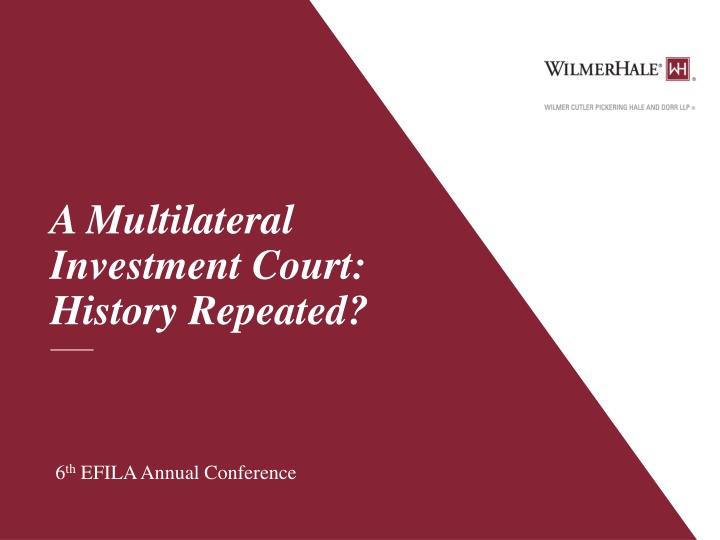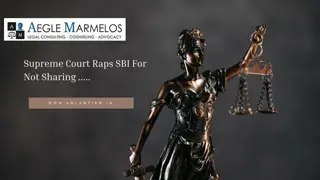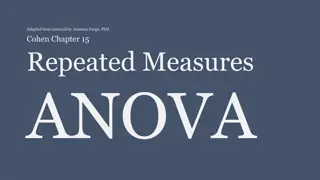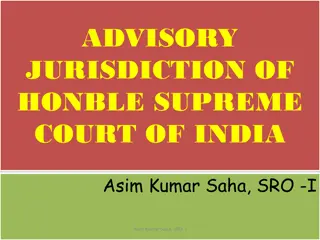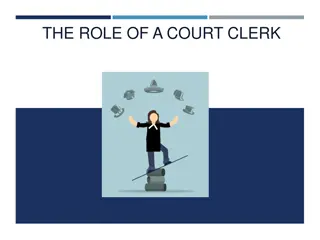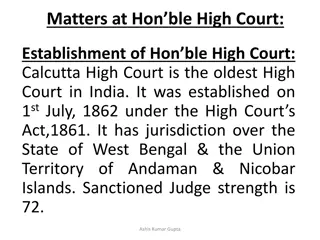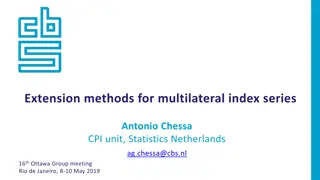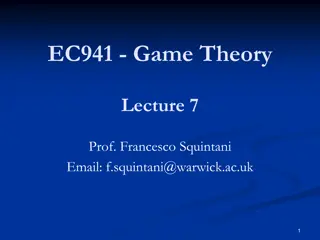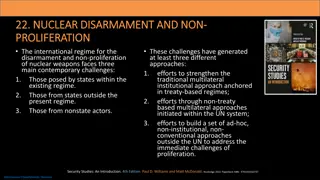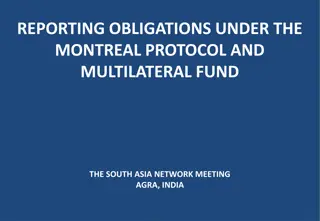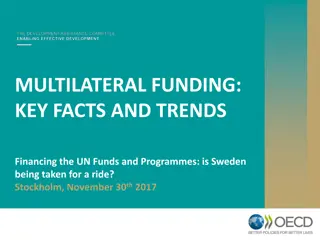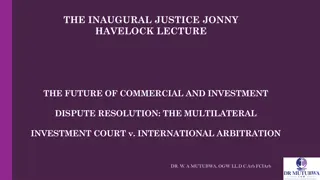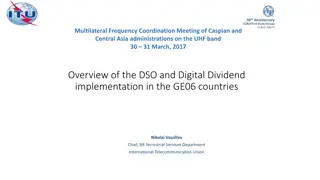A Multilateral Investment Court: History Repeated?
This presentation delves into the concept of a Multilateral Investment Court, its potential as a solution, and historical precedents. It also explores critiques of the current ISDS system, highlighting issues such as secrecy and lack of transparency in tribunals handling disputes between investors and governments.
Download Presentation

Please find below an Image/Link to download the presentation.
The content on the website is provided AS IS for your information and personal use only. It may not be sold, licensed, or shared on other websites without obtaining consent from the author.If you encounter any issues during the download, it is possible that the publisher has removed the file from their server.
You are allowed to download the files provided on this website for personal or commercial use, subject to the condition that they are used lawfully. All files are the property of their respective owners.
The content on the website is provided AS IS for your information and personal use only. It may not be sold, licensed, or shared on other websites without obtaining consent from the author.
E N D
Presentation Transcript
A Multilateral Investment Court: History Repeated? 6thEFILAAnnual Conference
W ILMERHALE Overview I. Investment Arbitration: A Recap II. Investment Arbitration: The Critiques III.Multilateral Investment Court: A Solution? IV.Multilateral Investment Court: History Repeated? 2
W ILMERHALE I. Investment Arbitration: A Recap If you googled ISDS I did that for my parliamentary confirmation hearing [in 2014] the first thing that came up in Google was International Sheep Dog Society. Financial Times, 8 October 2019 Cecilia Malstr m, European Commissioner for Trade (2014-2019) 3
W ILMERHALE I. Investment Arbitration: A Recap Diverse: 3,200 BITs among all conceivable national pairs and regional groupings Flexible: Individual states have tailored and adjusted substantive standards and procedures, depending on their needs and interests Evenhanded and Expert: Current ISDS system characterized by ability of states and investors to select tribunals for individual disputes Enforceable: States ultimately accountable for violations of international law Effective: Current ISDS system has contributed to unprecedented foreign direct investment and dramatic economic growth
W ILMERHALE I. Investment Arbitration: A Recap
W ILMERHALE I. Investment Arbitration: A Recap
W ILMERHALE II. Investment Arbitration: The Critiques Their meetings are secret. Their members are generally unknown. The decisions they reach need not be fully disclosed. Yet the way a small number of international tribunals handles disputes between investors and foreign governments has led to national laws being revoked, justice systems questioned and environmental regulations challenged. And it is all in the name of protecting the rights of foreign investors under the North American Free Trade Agreement. Nafta's Powerful Little Secret; Obscure Tribunals Settle Disputes, but Go Too Far, Critics Say, Anthony Depalma, The New York Times (11 March 2001). 7
W ILMERHALE II. Investment Arbitration: The Critiques [G]ive foreign firms a special right to apply to a secretive tribunal of highly paid corporate lawyers for compensation whenever a government passes a law to, say, discourage smoking, protect the environment or prevent a nuclear catastrophe. Yet that is precisely what thousands of trade and investment treaties over the past half century have done, through a process known as 'investor-state dispute settlement', or ISDS. The arbitration game, The Economist (11 October 2014). 8
W ILMERHALE III. Multilateral Investment Court: A Solution? Multilateral Investment Court proposed by the EU for all interested states to join First instance and appellate tribunal with standing panel of full-time adjudicators selected by states First instance tribunal: determine facts and apply law Appellate tribunal: power to reverse legal findings or serious errors in the weighing of facts 9
W ILMERHALE III. Multilateral Investment Court: A Solution? Adjudicators: Full-time, long-term, and (apparently) non-renewable positions; No outside activities; salaries comparable to other court systems paid by the MIC s member states; Expertise in public international law, adjudicating, and fact-finding; Assisted by a permanent secretariat. Proponents: MIC would (i) remedy structural defects of ISDS; (ii) reduce costs and duration of dispute resolution; (iii) achieve transparency and predictability through binding precedents 10
W ILMERHALE IV. Multilateral Investment Court: History Repeated? Transparency? Transparency has been progressively implemented by tribunals through procedural orders: Carrizosa v. Colombia, Procedural Order No. 2, 7 March 2019: [T]he Parties agreed that the present proceedings should be transparent and that the Tribunal would issue a procedural order governing the transparency regime. Ipek v. Turkey, Procedural Order No. 11 on Use of Arbitration Materials, 21 February 2020: Transparency [is] a means to promote good governance of States, the development of a well grounded and coherent body of case law in international investment law and therewith legal certainty and confidence in the system of investment arbitration. 11
W ILMERHALE IV. Multilateral Investment Court: History Repeated? Transparency? UNCITRAL Rules on Transparency: Article 3: [T]he following documents shall be made available to the public: the [NOA], the response to the [NOA], the [SoC], the [SoD] and any further written submissions any written submissions by the non-disputing Party and by third persons, transcripts of hearings ; and orders, decisions and awards of the arbitral tribunal. Article 6: [H]earings for the presentation of evidence or for oral argument shall be public. 12
W ILMERHALE IV. Multilateral Investment Court: History Repeated? Transparency? In many cases, States oppose transparency of the arbitral proceeding Amco Asia v. Indonesia Rand Serbiav. Metalclad v. Mexico, Decision on a Request by the Respondent for an Order Prohibiting the Claimant from Revealing Information, 27 October 1997: Mexico requested the Tribunal to issue a formal order declaring that the proceedings are confidential . The Respondent also complains of what it describes as a publicity campaign by the Claimants.
W ILMERHALE IV. Multilateral Investment Court: History Repeated? Transparency? In any event, simple solution amend BITs 2019 Dutch Model BIT, Article 20.13: The UNCITRAL Transparency Rules shall apply to disputes under this Section. Comprehensive Economic and Trade Agreement (CETA), Article 8.36.1: The UNCITRAL Transparency Rules, as modified by this Chapter, shall apply in connection with [ISDS] proceedings under this Section. 2014 Mauritius Convention: Entered into force in 2017. Seven ratifications; no EU Member States
W ILMERHALE IV. Multilateral Investment Court: History Repeated? Third Party Participation? Investment tribunals allow third parties to file amicus curiae briefs when public interests are at stake: Philip Morris v. Uruguay Infinito Gold Ltd. v. Costa Rica, Procedural Order No. 2, 1 June 2016: APREFLOFAS s general purpose as an NGO is the protection of the environment [and] can thus be deemed to have an interest in ensuring that this Tribunal has all the information necessary to its decision-making. Bear Creek v. Peru, Procedural Order No. 5, 21 July 2016: [I]t appears to the Tribunal that DHUMA s local knowledge of the facts may add a new perspective that differs from that of the Parties. 15
W ILMERHALE IV. Multilateral Investment Court: History Repeated? Third Party Participation? Non-disputing party submissions are increasingly common in investment arbitration European Commission has intervened in numerous proceedings: AES v. Hungary; Electrabel v. Hungary; Achmea v. Slovak Republic, Vattenfall v. Germany Non-disputing party submissions are uncommon in many international courts
W ILMERHALE IV. Multilateral Investment Court: History Repeated? Third Party Participation? In any event, simple solution amend BITs 2019 Dutch Model BIT, Article 20.13: The Tribunal and the disputing parties shall give positive consideration to a request from a third party to submit as an amicus curiae oral or written submissions
W ILMERHALE IV. Multilateral Investment Court: History Repeated? Independence and Impartiality? Existing ISDS mechanisms contain robust and highly-effective mechanisms for ensuring independence and impartiality of arbitrators Parties Role in Selection Substantive Requirements Disclosure Obligations Challenge and Removal Procedures 18
W ILMERHALE IV. Multilateral Investment Court: History Repeated? Independence and Impartiality? UNCITRAL Rules: Article 11: When a person is approached in connection with his or her possible appointment as an arbitrator, he or she shall disclose any circumstances likely to give rise to justifiable doubts as to his or her impartiality or independence. Article 12: Any arbitrator may be challenged if circumstances exist that give rise to justifiable doubts as to the arbitrator s impartiality or independence. 19
W ILMERHALE IV. Multilateral Investment Court: History Repeated? Independence and Impartiality? IBA Guidelines on Conflicts of Interest in International Arbitration: General Principle: Every arbitrator should be impartial and independent of the parties at the time of accepting an appointment to serve and shall remain so until the final award has been rendered or the proceedings have otherwise finally terminated. Conflicts of Interest: An arbitrator shall decline to accept an appointment or refuse to continue to act as an arbitrator, if he or she has any doubt as to his or her ability to be impartial or independent. Doubts are justifiable if a reasonable third person, having knowledge of the relevant facts and circumstances, would reach the conclusion that there is a likelihood that the arbitrator may be influenced by factors other than the merits of the case as presented by the parties in reaching his or her decision.
W ILMERHALE IV. Multilateral Investment Court: History Repeated? Independence and Impartiality? IBA Guidelines on Conflicts of Interest in International Arbitration: Disclosure by the Arbitrator: If facts or circumstances exist that may, in the eyes of the parties, give rise to doubts as to the arbitrator s impartiality or independence, the arbitrator shall disclose such facts or circumstances . Any doubt as to whether an arbitrator should disclose certain facts or circumstances should be resolved in favour of disclosure. Duties of the Parties and the Arbitrator: A party shall inform of any relationship, direct or indirect, between the arbitrator and the party or between the arbitrator and any person or entity with a direct economic interest in the award The party shall do so on its own initiative at the earliest opportunity. A party shall inform of the identity of its counsel appearing in the arbitration, as well as of any relationship between its counsel and the arbitrator.
W ILMERHALE IV. Multilateral Investment Court: History Repeated? Independence and Impartiality? ICSID Convention: Article 14(1): Persons designated to serve on the Panels shall be persons of high moral character and recognized competence in the fields of law, commerce, industry or finance, who may be relied upon to exercise independent judgment. Competence in the field of law shall be of particular importance in the case of persons on the Panel of Arbitrators. Article 57: A party may propose to a Commission or Tribunal the disqualification of any of its members on account of any fact indicating a manifest lack of the qualities required by paragraph (1) of Article 14.
W ILMERHALE IV. Multilateral Investment Court: History Repeated? Independence and Impartiality? MIC undermines adjudicators independence and impartiality: MIC appointed exclusively by states without participation by investors; states also decide compensation and, potentially, any reappointment of adjudicators Disproportionate influence of one interested party on adjudicators, condemned in most settings: Star Chamber: one side chooses all adjudicators, with respect to a narrow set of issues involving that side; Court-packing: United States; Ecuador; Hungary; Poland 23
W ILMERHALE IV. Multilateral Investment Court: History Repeated? Independence and Impartiality? Posner & De Figueiredo (2004): Strongevidence that ICJ judges favor (1) state that appoints them; (2) states whose wealth level is close to judge own state s; (3) states with similar political systems to judge own state s. Judges voted for home state parties about 90% of the time, while about 48% for non-home states. Voeten (2008): Someevidence that European Court of Human Rights judges career insecurities make judges likely to favor their national government when it is a party to a dispute. Study found that evidence suggests that international judges are policy seekers [and] politically motivated actors. 24
W ILMERHALE IV. Multilateral Investment Court: History Repeated? Double Hatting? Want adjudicators from the next generation, more diversity, people from developing countries, more women? Double hatting likely necessary Simple solution if double-hatting is not desired: 2019 Dutch Model BIT, Article 20(5) Comprehensive Economic and Trade Agreement (CETA), Article 8.30.1 ICSID and UNCITRAL Draft Code of Conduct for Adjudicators 25
W ILMERHALE IV. Multilateral Investment Court: History Repeated? Forum Shopping? Decisions have identified forum shopping as an abuse of rights or an abuse of process, dismissing claims. Phillip Morris v. Australia, Award on Jurisdiction and Admissibility, 17 December 2015: The Tribunal concludes that the initiation of a treaty-based investor-State arbitration constitutes an abuse of rights (or an abuse of process, the rights abused being procedural in nature) when an investor has changed its corporate structure to gain the protection of an investment treaty at a point in time when a specific dispute was foreseeable. Levy and Gremcitel v. Peru, Award, 9 January 2015: [T]he tribunal cannot but conclude that the corporate restructuring [ ] constitutes an abuse of process. Therefore, the Tribunal is precluded from exercising jurisdiction over this dispute. 26
W ILMERHALE IV. Multilateral Investment Court: History Repeated? Forum Shopping? Simple solution amend BITs: In 2004, Chile and Korea terminated their 1996 BIT and replaced it with a new FTA which now includes a denial of benefits clause. In 2009, Peru and Singapore terminated their 2003 BIT and replaced it with a new FTA which now includes a denial of benefits clause.
W ILMERHALE IV. Multilateral Investment Court: History Repeated? Costly and Slow? Average commercial arbitration is 12-18 months; average ICJ case is 4 years; average investment arbitration is approximately 3.86 years. ISDS proceedings are comparatively slow principally because of states insistence on long and bifurcated proceedings: States challenged the tribunal s jurisdiction in approximately 41% of cases States were completely successful in only 18.9% of those cases (or less than 8% of all cases) 28
W ILMERHALE IV. Multilateral Investment Court: History Repeated? Costly and Slow? Investors fees in bifurcated cases were $6.4 million, while in non- bifurcated cases $4.1 million. Tribunal and administrative costs in bifurcated cases were around $1 million, while in non-bifurcated cases costs were 50% less. 29
W ILMERHALE IV. Multilateral Investment Court: History Repeated? Costly and Slow? States would bear costs of maintaining a MIC adjudicators and staff salaries, permanent facilities: International Tribunal for the Law of the Sea: has only heard 29 cases in 26 years, two of which were advisory opinions. Budget for the 2019- 2020 period is EUR 20,521,200, although only two cases are pending before the tribunal. International Criminal Court: estimated expenditure was around $900 million in first ten years (with one verdict) Criminal Tribunal for the former Yugoslavia: annual budget increased 500-fold from its inception in 1993 until 2010-11, spent $695 million in its first ten years 30
W ILMERHALE IV. Multilateral Investment Court: History Repeated? Costly and Slow? An appellate mechanism will significantly increase costs and duration of proceedings. Between 2011-2018, annulment under ICSID requested in 51% of awards even though success rate is only 3%. With broader review powers, appeals will increase. De novo review may have perverse incentive of leading arbitrators to overdoit to ensure every single point, even tangential, is addressed and briefed. 31
W ILMERHALE IV. Multilateral Investment Court: History Repeated? Right to Regulate Ignored? Awards have repeatedly recognized states regulatory powers Sun Reserve Luxco v. Italy, Award, 25 March 2020: Not every shortcoming in a State s action will justify a claim for breach of the FET standard it must be shown that the host State s conduct was manifestly or grossly unfair or unreasonable, was arbitrary or discriminatory, constituted a denial of justice in national proceedings in the host State, or that the host State engaged in a willful neglect of duty or a willful disregard of due process of law, or showed an extreme insufficiency of action falling far below international standards. 32
W ILMERHALE IV. Multilateral Investment Court: History Repeated? Right to Regulate Ignored? Marfin v. Cyprus, Award, 26 July 2018: The Tribunal considers that the economic harm consequent to the non-discriminatory application of generally applicable regulations adopted in order to protect the public welfare do not constitute a compensable taking, provided that the measure was taken in good faith, complied with due process and was proportionate to the aim sought to be achieved. Servier v. Poland,Award, 14 February 2012: The Tribunal agrees with the Parties that a host state's regulatory and/or administrative actions must be taken (i) in good faith, (ii) for a public purpose, (iii) in a way proportional to that purpose, and (iv) in a non-discriminatory manner. 33
W ILMERHALE IV. Multilateral Investment Court: History Repeated? Right to Regulate Ignored? Simple solution Amend BITs 2012 U.S. Model Investment Treaty, Annex B Expropriation, 4(b): Except in rare circumstances, non-discriminatory regulatory actions by a Party that are designed and applied to protect legitimate public welfare objectives, such as public health, safety, and the environment, do not constitute indirect expropriations. Comprehensive and Economic Trade Agreement (CETA), Article 8.9: The Parties reaffirm their right to regulate within their territories to achieve legitimate policy objectives, such as the protection of public health, safety, the environment or public morals, social or consumer protection or the promotion and protection of cultural diversity. 34
W ILMERHALE IV. Multilateral Investment Court: History Repeated? Lack of Uniformity and Consistency? More than 3,200 BITs with widely differing substantive standards Different generations of BITs 1970s versus 2020: widely differing standards based on widely different national objectives in different pairs of states language, culture, stage of development, political climate Deliberate policy choices between different sets of nations or geographic regions no one size fits all; no uniformity (and no desire by states for uniformity) MIC denies states autonomy to choose own solutions and dispute resolution mechanisms; instead, imposes single, Euro-centric set of standards 35
W ILMERHALE IV. Multilateral Investment Court: History Repeated? Lack of Uniformity and Consistency? Is there real lack of consistency? Relatively few issues as to which different tribunals actually interpret and apply identical provisions in a materially different way (e.g., FET, MFN) Inevitable differences in emphasis and reasoning in different decisions, even with identical provisions occurs in virtually all national legal systems and is very unlikely to disappear entirely in a permanent court; is also not harmful Consequences of wrong decisions for other tribunals are limited future tribunals are not bound by wrong decisions 36
W ILMERHALE IV. Multilateral Investment Court: History Repeated? Lack of Uniformity and Consistency? Insofar as there are material differences in interpretation of broadly-phrased standards (like FET or MFN), the appropriate response to disagreement with particular interpretations is for States to: Present their arguments to tribunal, explain transparently why one standard is preferable to another; Transparently adopt interpretations of treaties; Transparently amend treaties which are interpreted in ways that States do not support The legitimate and politically-accountable manner to make changes to substantive standards. Not through packing tribunals with sympathetic judges; that is neither fair nor politically accountable 37
W ILMERHALE IV.Multilateral Investment Court: History Repeated? 1933 Reichs Directive: [a]ll disputes arising contracts between the Reich and private individuals are in principle to be brought to a decision before courts from the state 38
W ILMERHALE IV. Multilateral Investment Court: History Repeated? 1933 Reichs Directive: [the] advantages [of arbitration] are problematic in their nature and at any rate cannot compensate the disadvantage of far greater legal uncertainty of arbitration compared to litigation. Particularly because according to the prevailing opinion arbitrators are not bound by the applicable material law, because there is no principle of public nature of the proceedings, and because there is no safeguard like the stages of appeal, the organizational guarantees for the setup of an objective decision are far lower than in litigation, even if the arbitrators make every effort to ensure objectivity. Lastly, from a state policy point of view it has to be considered that an extension of arbitration ultimately presents a disturbance of the trust in the state courts and the state itself. [Therefore,] all disputes arising from contracts between the Reich and private individuals are in principle to be brought to a decision before state courts. 39
A Multilateral Investment Court: History Repeated? 6th EFILA Annual Conference January 14th, 2021
